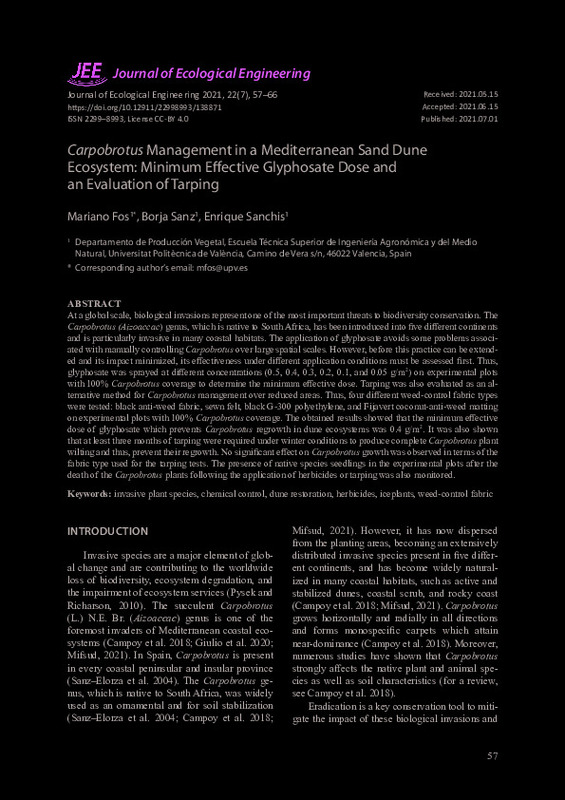JavaScript is disabled for your browser. Some features of this site may not work without it.
Buscar en RiuNet
Listar
Mi cuenta
Estadísticas
Ayuda RiuNet
Admin. UPV
Carpobrotus Management in a Mediterranean Sand Dune Ecosystem: Minimum Effective Glyphosate Dose and an Evaluation of Tarping
Mostrar el registro sencillo del ítem
Ficheros en el ítem
| dc.contributor.author | Fos Causera, Mariano
|
es_ES |
| dc.contributor.author | Sanz Vidal, Francisco de Borja
|
es_ES |
| dc.contributor.author | Sanchís Duato, Enrique
|
es_ES |
| dc.date.accessioned | 2022-10-06T18:05:59Z | |
| dc.date.available | 2022-10-06T18:05:59Z | |
| dc.date.issued | 2021-07 | es_ES |
| dc.identifier.uri | http://hdl.handle.net/10251/187205 | |
| dc.description.abstract | [EN] At a global scale, biological invasions represent one of the most important threats to biodiversity conservation. The Carpobrotus (Aizoaceae) genus, which is native to South Africa, has been introduced into five different continents and is particularly invasive in many coastal habitats. The application of glyphosate avoids some problems associated with manually controlling Carpobrotus over large spatial scales. However, before this practice can be extended and its impact minimized, its effectiveness under different application conditions must be assessed first. Thus, glyphosate was sprayed at different concentrations (0.5, 0.4, 0.3, 0.2, 0.1, and 0.05 g/m(2)) on experimental plots with 100% Carpobrotus coverage to determine the minimum effective dose. Tarping was also evaluated as an alternative method for Carpobrotus management over reduced areas. Thus, four different weed-control fabric types were tested: black anti-weed fabric, sewn felt, black G-300 polyethylene, and Fijavert coconut-anti-weed matting on experimental plots with 100% Carpobrotus coverage. The obtained results showed that the minimum effective dose of glyphosate which prevents Carpobrotus regrowth in dune ecosystems was 0.4 g/m(2). It was also shown that at least three months of tarping were required under winter conditions to produce complete-Carpobrotus plant wilting and thus, prevent their regrowth. No significant effect on Carpobrotus growth was observed in terms of the fabric type used for the tarping tests. The presence of native species seedlings in the experimental plots after the death of the Carpobrotus plants following the application of herbicides or tarping was also monitored. | es_ES |
| dc.description.sponsorship | This study was made possible by significant support from the Conselleria de Territori i Habitatge, Generalitat Valenciana (grant Number T621700) and from the Conselleria d'Educacio, Generalitat Valenciana (project GVPRE/2008/134). The authors would also like to thank the Valencian Regional Government environmental officers, Gabriel Ballester and Vicente Deltoro for their logistical support. | es_ES |
| dc.language | Inglés | es_ES |
| dc.publisher | Polish Society of Ecological Engineering | es_ES |
| dc.relation.ispartof | Journal of Ecological Engineering | es_ES |
| dc.rights | Reconocimiento (by) | es_ES |
| dc.subject | Invasive plant species | es_ES |
| dc.subject | Chemical control | es_ES |
| dc.subject | Dune restoration | es_ES |
| dc.subject | Herbicides | es_ES |
| dc.subject | Iceplants | es_ES |
| dc.subject | Weed-control fabric | es_ES |
| dc.subject.classification | FISIOLOGIA VEGETAL | es_ES |
| dc.title | Carpobrotus Management in a Mediterranean Sand Dune Ecosystem: Minimum Effective Glyphosate Dose and an Evaluation of Tarping | es_ES |
| dc.type | Artículo | es_ES |
| dc.identifier.doi | 10.12911/22998993/138871 | es_ES |
| dc.relation.projectID | info:eu-repo/grantAgreement/GENERALITAT VALENCIANA//T621700//ESTUDI DELS EFECTES DE L'ELIMINACIO DE CARPOBROTUS AMB GLIFOSAT SOBRE LA REGENERACIO DE LA VEGETACIO DUNAR/ | es_ES |
| dc.relation.projectID | info:eu-repo/grantAgreement/GENERALITAT VALENCIANA//GVPRE%2F2008%2F134//EVALUACION DE METODOS QUIMICOS Y MULCHING COMO ALTERNATIVA A LA ERRADICACION EN ZONAS DUNARES DE LA PLANTA EXOTICA INVASORA / | es_ES |
| dc.rights.accessRights | Abierto | es_ES |
| dc.contributor.affiliation | Universitat Politècnica de València. Departamento de Producción Vegetal - Departament de Producció Vegetal | es_ES |
| dc.contributor.affiliation | Universitat Politècnica de València. Escuela Politécnica Superior de Gandia - Escola Politècnica Superior de Gandia | es_ES |
| dc.description.bibliographicCitation | Fos Causera, M.; Sanz Vidal, FDB.; Sanchís Duato, E. (2021). Carpobrotus Management in a Mediterranean Sand Dune Ecosystem: Minimum Effective Glyphosate Dose and an Evaluation of Tarping. Journal of Ecological Engineering. 22(7):57-66. https://doi.org/10.12911/22998993/138871 | es_ES |
| dc.description.accrualMethod | S | es_ES |
| dc.relation.publisherversion | https://doi.org/10.12911/22998993/138871 | es_ES |
| dc.description.upvformatpinicio | 57 | es_ES |
| dc.description.upvformatpfin | 66 | es_ES |
| dc.type.version | info:eu-repo/semantics/publishedVersion | es_ES |
| dc.description.volume | 22 | es_ES |
| dc.description.issue | 7 | es_ES |
| dc.identifier.eissn | 2299-8993 | es_ES |
| dc.relation.pasarela | S\447220 | es_ES |
| dc.contributor.funder | GENERALITAT VALENCIANA | es_ES |
| dc.contributor.funder | Universitat Politècnica de València | es_ES |
| dc.subject.ods | 15.- Proteger, restaurar y promover la utilización sostenible de los ecosistemas terrestres, gestionar de manera sostenible los bosques, combatir la desertificación y detener y revertir la degradación de la tierra, y frenar la pérdida de diversidad biológica | es_ES |
| upv.costeAPC | 325 | es_ES |








